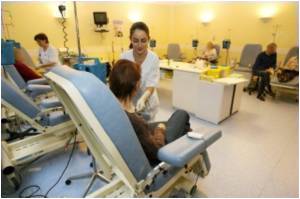A new multigene test has been developed by scientists to identify the risk of recurrence of breast cancer.

This is the first time a multigene test has been used to differentiate lower-risk and more aggressive forms of ductal carcinoma in situ (DCIS) and will allow physicians to spare many patients the need to undergo radiation, according to researchers.
Lawrence J. Solin, M.D., FACR, FASTRO, chair of the department of radiation oncology at Einstein Medical Center in Philadelphia, presented the results at the 2011 CTRC-AACR San Antonio Breast Cancer Symposium (SABCS), held Dec. 6-10, 2011.
"Using a molecular-based assay, we have successfully identified patients at higher risk for recurrence and patients at lower risk," said Solin. "This is an important advance for women with newly diagnosed DCIS. By predicting individual risk, physicians can provide a more tailored treatment program for each patient."
The validation study of the DCIS Score was a collaboration among the Eastern Cooperative Oncology Group (ECOG), North Central Cancer Treatment Group and Genomic Health. The validation utilized patient tumor samples from E5194, an ECOG-led, multi-institutional study of patients with low-, intermediate- or high-grade DCIS who had been treated surgically but had not received radiation. E5194 was the first prospective study of local excision alone for DCIS, and its five-year results were reported at SABCS in 2006 (L. Hughes).
Researchers tested and scored tumors from 327 patients to determine their risk for recurrence. The DCIS validation study team used the Oncotype DX breast cancer assay, which has been available for invasive breast cancer since 2004, and a DCIS Score algorithm to study these tumor samples.
Solin also reported 10-year results of E5194, in which 46 patients had an ipsilateral breast event (IBE; defined as ipsilateral local recurrence of DCIS or invasive cancer) at a median follow-up of 8.8 years. Continuous DCIS Score was significantly associated with IBE when adjusted for tamoxifen use and provided value beyond the traditional measures of tumor size, tumor grade and margin status.
"The DCIS Score will help physicians understand the underlying biology of DCIS for an individual patient and accurately gauge the risk for that person," said Solin. "As a result, the patient and physician can decide on the appropriate course of treatment based on a more complete understanding of the risk involved."
Source-Eurekalert
 MEDINDIA
MEDINDIA




 Email
Email










